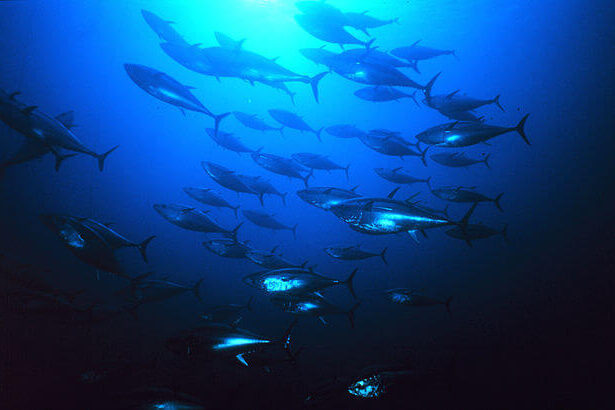
The UK’s seas have experienced their warmest start to the year since records began, driving dramatic shifts in marine life and affecting fishing communities.
Analysis of provisional Met Office data by the BBC shows that in the seven months to the end of July, the average sea surface temperature around the UK was more than 0.2C higher than any year since 1980.
While that may sound modest, UK waters are now significantly warmer than just a few decades ago — a long-term trend driven by the burning of fossil fuels.
The heat is reshaping the UK’s marine ecosystems, with some species thriving in the warmer conditions while others struggle to survive.
Scientists and wildlife enthusiasts have recorded unusual numbers of species rarely seen in British waters, including octopus, bluefin tuna and mauve stinger jellyfish.
Although natural cycles and fishing pressures also influence populations, researchers highlight rising sea temperatures as a key factor.
“Things like jellyfish, like octopus… they are the sorts of things that you expect to respond quickly to climate change,” said Dr Bryce Stewart, a senior research fellow at the Marine Biological Association in Plymouth.
“It’s a bit like the canary in the coal mine – the sorts of quite extraordinary changes we’ve seen over the last few years really do indicate an ecosystem under flux,” he added.
Nineteen-year-old angler Harry Polkinghorne described seeing bluefin tuna frequently, sometimes in huge schools engaged in frenzied feeding.
“It’s just like watching a washing machine in the water,” he said. “You can just see loads of white water, and then tuna fins and tuna jumping out.”
Numbers of the fish have been rising off south-west England for the past decade, partly due to warmer waters and improved population management, according to Dr Stewart.
Heather Hamilton, who snorkels off Cornwall with her father David almost every week, said they had swum through vast blooms of salps — a jellyfish-like creature once rare in UK waters, but now appearing more often.
“You’re seeing these big chains almost glowing slightly like fairy lights”, she said.
“It just felt very kind of out of this world, something I’ve never seen before.”
Yet while some species are on the rise, others adapted to colder seas, such as cod and wolf-fish, are being pushed to their limits by extreme heat and past overfishing.
“We’re definitely seeing this shift of cooler water species moving north in general,” said Dr Stewart.
Marine heatwave conditions — extended periods of abnormally high sea surface temperatures — have persisted around parts of the UK for much of the year. Exceptional temperatures have also been detected by monitoring buoys operated by the Centre for Environment, Fisheries and Aquaculture Science (Cefas).
The record warmth of 2025 follows exceptionally high sea temperatures in both 2023 and 2024. The Met Office notes that the latest figures, covering June 2024 onwards, remain provisional but are unlikely to change substantially.
“All the way through the year, on average it’s been warmer than we’ve really ever seen [for the UK’s seas],” said Prof John Pinnegar, the lead adviser on climate change at Cefas.
“[The seas] have been warming for over a century and we’re also seeing heatwaves coming through now,” he added.
“What used to be quite a rare phenomenon is now becoming very, very common.”
Like heatwaves on land, sea temperatures are affected by natural fluctuations and weather patterns. Prolonged sunny, calm conditions such as those in early July can heat the sea surface rapidly.
But the underlying driver is human-induced climate change. The world’s oceans have absorbed about 90% of the excess heat from greenhouse gas emissions, making marine heatwaves more frequent and more severe.
“The main contributor to the marine heatwaves around the UK is the buildup of heat in the ocean,” said Dr Caroline Rowland, head of oceans, cryosphere and climate change at the Met Office.
“We predict that these events are going to become more frequent and more intense in the future” due to climate change, she added.
Warmer seas can in turn intensify land heatwaves by reducing cooling breezes, increase the risk of heavy rainfall, and weaken the ocean’s capacity to absorb carbon dioxide; potentially accelerating global warming.
The consequences are already being felt in coastal communities.
Ben Cooper, a fisherman in Whitstable, Kent, has relied on common whelks—a cold-water sea snail—since 1997. A marine heatwave in 2022 caused a mass die-off in the Thames Estuary, devastating stocks.
“Pretty much 75% of our earnings is through whelks, so you take that away and all of a sudden you’re struggling,” explained Mr Cooper.
Although populations had begun to recover, he says the latest heat has forced him to scale back his business.
He recalls fishing for cod with his father in the 1980s; once a staple catch, now increasingly scarce in warming waters.
“We lost the cod because basically the sea just got too warm. They headed further north,” he said.
While the distribution of marine species naturally fluctuates from year to year, researchers warn that the long-term trend is clear: as the planet continues to heat up, the make-up of life in UK seas will keep changing.
“The fishers might in the long term have to change the species that they target and that they catch,” suggested Dr Pinnegar.
“And we as consumers might have to change the species that we eat.”
——————————————————————————
At Natural World Fund, we are passionate about restoring habitats in the UK to halt the decline in our wildlife.

